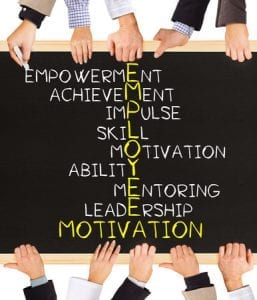To grow the business founders must assess the task relevant maturity of each employee’s experience with a particular task to manage them effectively.
The Business is Everyone’s Business (Part 2)
Dave Concannon left a long and thoughtful comment on yesterday’s “The Business is Everyone’s Business”
Recently, a developer I work with sent a mail around to the (small) team that blew me away. After a glitch with an internal system he sent a mail which read: “Who’s job is it to fix this?”.
When you have someone who can’t take personal responsibility for something that falls directly within their skill set, I’d be wary of their direct involvement in the bigger picture.
Certainly, their opinion is as valid as anyone else’s. Even just ensuring that every section of the business knows what everyone else is doing works well – internal newsletters, some sort of internal social network on yammer or ning etc helps.
My feeling is that there are two types of people – one group just need to be told what to do, the other need to be given the space to develop great ideas (be they business, technical etc). Mixing these types up may be disastrous. If you have too many of the first type, it might be that your hiring process needs attention. I blogged about this in more detail at “How to Run a Company into the Ground.”
In Dave’s formulation there are two kinds of people
- A People who just need space to be able to develop great idea.
- B People who just need to be told what to do.
I think he needs more than a one bit encoding for people’s values, skills, and task relevant maturity.
Task Relevant Maturity
Task relevant maturity is a person’s experience with the particular task and prior performance of it. I believe that it was coined by Blanchard and Hersey in “Management of Organizational Behavior” as a part of their situational leadership model (originally called “life cycle leadership model”).
I like Andrew Grove’s “High Output Management” suggestions for how to select the right management style for the individuals task relevant maturity (from page 175):
| Task Relevant Maturity | Appropriate Leadership Style |
|---|---|
| Low | structured and task oriented, tell “what”, “when”, and “how” |
| Medium | individual oriented, emphasis on two way communication, support, and reasoning |
| High | minimal management involvement, establish objectives and monitoring |
Grove has two suggestions for the level of monitoring that “apply quality assurance principles”:
- Monitor at the lowest value added stage in the process. For example, review *rough drafts* of reports that have been assigned, don’t wait for a subordinate to spend time polishing them into final form when you have a problem with the contents.
- Check more frequently depending upon his task relevant maturity and how dynamic the environment that he is operating in.
Grove’s book has a number of excellent suggestions for management techniques that are very applicable to the challenges bootstrapping entrepreneurs face.
I had two other thoughts on Dave’s example.
- Everyone benefits from checklists. Even experts benefit, consider an experienced flight crew doing a pre-flight checklist each time they prepares for take-off. Checklists free up your focus for the hard problems and the real risks and uncertainties that the organization faces. As an organization grows, formal policies make for a predictable customer experience (certainly a key element of any brand promise). It doesn’t mean that they should be followed blindly.
- Skill deficits can be addressed, values conflicts are often difficult to resolve. I think it’s also important to distinguish between experience or skill mismatches to task needs, which can be addressed with appropriate management and training, and values conflicts between and individual and team or firm culture. That latter are much more difficult to address. The developer asking “whose job is this?” in Dave’s example may be experiencing a values conflict as much as a lack of task relevant maturity.
Unlike Dave’s static model Grove suggests that training that increases employee task relevant maturity increases management leverage and reduces the amount of time that needs to be devoted to managing a subordinate. I think that this is something founder’s sometimes have trouble with, learning how to train and delegate so that they can continue to scale the organization can often feel like loss of control.
Note: Grove’s model is simpler in some ways than the situational leadership Tell, Sell, Participate, Delegate model but his stress on the need to establish objectives and monitoring and his focus on increasing managerial leverage make it a better approach for startup entrepreneurs in my opinion.


Excellent! Thank you for adding some needed perspective to my argument. I’m picking up a copy of ‘High Output Management’ based on your recommendation.
The concept of ‘Value conflicts’ reminded me of the book ‘Tribal Leadership’ which defines 5 stages of corporate culture. It explores how individuals’ value differences can be addressed at different stages of the organization, leading them from inwardly-focused attitudes towards team-focused and goal-directed behaviors.
Thanks again Sean.
Pingback: SKMurphy » The Business is Everyone’s Business
Pingback: SKMurphy, Inc. Delegation Needed For Growth - SKMurphy, Inc.
Pingback: SKMurphy, Inc. Podcast with Pete Tormey: Bootstrapper's Delegation Checklist
Pingback: SKMurphy, Inc. Newsletter: Effective Delegation - SKMurphy, Inc.